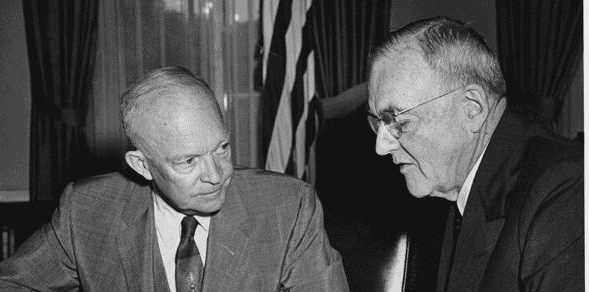
Bull in a China Shop: John Foster Dulles? Not Churchill’s Line
Dulles: Not Churchill’s Bull…
A recent article declares: “Winston Churchill once described American diplomacy as ‘a bull who carries his own china shop around with him.’” Is this an accurate quote, and if so, in relation too what? —L.K., Texas
It’s not Churchill but frequently cited—not regarding American diplomacy but an American diplomat. The alleged victim was President Eisenhower’s Secretary of State John Foster Dulles. But Churchill never said that about him, nor anyone else. Nor did Churchill call Dulles “the only bull I know who carries his china shop with him.” (Though the thought might have occurred to him.)
These or similar words do not track among Churchill’s 20 million published words (books, articles, speeches, papers, letters), or 60 million about him by biographers and memoirists digitally scanned by the Hillsdale College Churchill Project. (The “china shop” phrase comes up 22 times, most of them remarks about Churchill!)
“Dull, Duller, Dulles…”
This is not to say Churchill issued no barbs at the American Secretary of State. Well before they met, at the December 1953 Bermuda Conference, WSC told John Colville “I will have no more to do with Dulles, whose great slab of a face I dislike and distrust.” Colville added:
W. was really worked up and, as he went to bed, said some very harsh things about the Republican Party in general and Dulles in particular, which Christopher [Soames] and I thought both unjust and dangerous. [1]
At Bermuda, where he was anxious to plan a summit conference with Stalin’s successor in Moscow, Churchill told his doctor Lord Moran that Dulles was blocking his efforts:
fellow preaches like a Methodist Minister, and his bloody text is always the same: that nothing but evil can come out of meeting with Malenkov. Dulles is a terrible handicap. Ten years ago I could have dealt with him. Even as it is I have not been defeated by this bastard. I have been humiliated by my own decay.
We also have this bouquet, recorded without a date by WSC’s last private secretary: “Dull, Duller Dulles.” [3] Despite it all, with his usual magnanimity, Churchill paid a hospital visit to the dying Dulles on his visit to Washington in 1959. Winston Churchill was not a hater.
Endnotes
- Colville Diary, 7 January 1953, in John Colville, The Fringes of Power: Downing Street Diaries 1940–1955, 2 vols. (Sevenoaks, Kent: Sceptre Publishing, 1986–87), II, 320.
- Moran Diary, 7 December 1953, in Charles Moran, Winston Churchill: The Struggle for Survival, 1940-1965 (London, Constable, 1965), 540-41.
- Anthony Montague Browne, Long Sunset: Memoirs of Winston Churchill’s Last Private Secretary (London: Cassell, 1995), 126.






